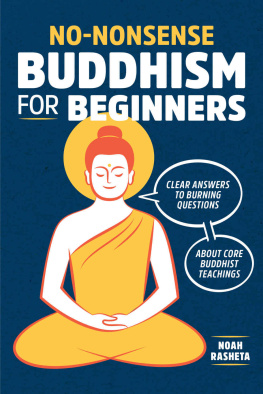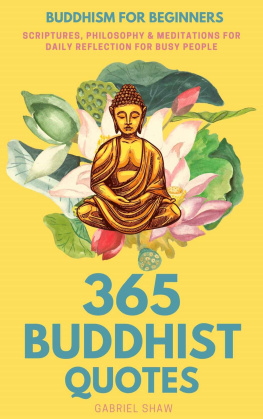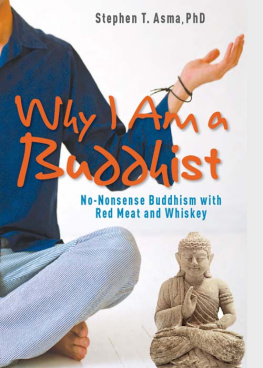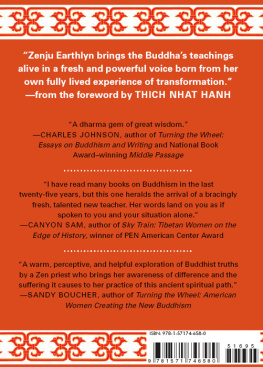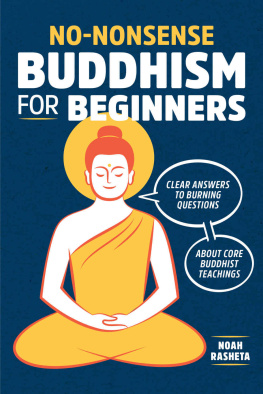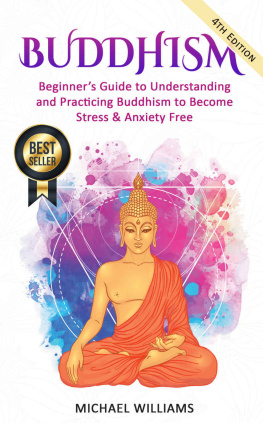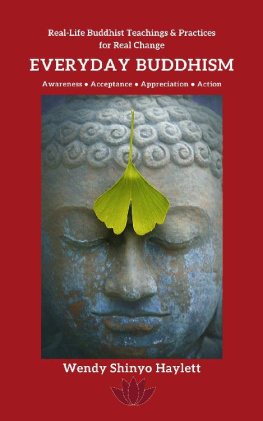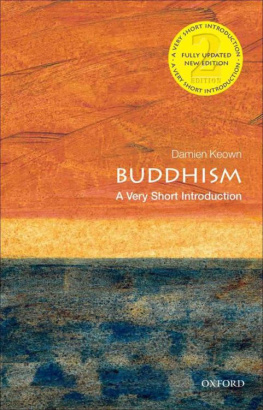Noah Rasheta - No-Nonsense Buddhism for Beginners
Here you can read online Noah Rasheta - No-Nonsense Buddhism for Beginners full text of the book (entire story) in english for free. Download pdf and epub, get meaning, cover and reviews about this ebook. year: 2018, publisher: Althea Press, genre: Religion. Description of the work, (preface) as well as reviews are available. Best literature library LitArk.com created for fans of good reading and offers a wide selection of genres:
Romance novel
Science fiction
Adventure
Detective
Science
History
Home and family
Prose
Art
Politics
Computer
Non-fiction
Religion
Business
Children
Humor
Choose a favorite category and find really read worthwhile books. Enjoy immersion in the world of imagination, feel the emotions of the characters or learn something new for yourself, make an fascinating discovery.
- Book:No-Nonsense Buddhism for Beginners
- Author:
- Publisher:Althea Press
- Genre:
- Year:2018
- Rating:4 / 5
- Favourites:Add to favourites
- Your mark:
- 80
- 1
- 2
- 3
- 4
- 5
No-Nonsense Buddhism for Beginners: summary, description and annotation
We offer to read an annotation, description, summary or preface (depends on what the author of the book "No-Nonsense Buddhism for Beginners" wrote himself). If you haven't found the necessary information about the book — write in the comments, we will try to find it.
No-Nonsense Buddhism for Beginners — read online for free the complete book (whole text) full work
Below is the text of the book, divided by pages. System saving the place of the last page read, allows you to conveniently read the book "No-Nonsense Buddhism for Beginners" online for free, without having to search again every time where you left off. Put a bookmark, and you can go to the page where you finished reading at any time.
Font size:
Interval:
Bookmark:


Copyright 2018 by Noah Rasheta
No part of this publication may be reproduced, stored in a retrieval system or transmitted in any form or by any means, electronic, mechanical, photocopying, recording, scanning, or otherwise, except as permitted under Sections 107 or 108 of the 1976 United States Copyright Act, without the prior written permission of the Publisher. Requests to the Publisher for permission should be addressed to the Permissions Department, Althea Press, 6005 Shellmound Street, Suite 175, Emeryville, CA 94608.
Limit of Liability/Disclaimer of Warranty: The Publisher and the author make no representations or warranties with respect to the accuracy or completeness of the contents of this work and specifically disclaim all warranties, including without limitation warranties of fitness for a particular purpose. No warranty may be created or extended by sales or promotional materials. The advice and strategies contained herein may not be suitable for every situation. This work is sold with the understanding that the Publisher is not engaged in rendering medical, legal, or other professional advice or services. If professional assistance is required, the services of a competent professional person should be sought. Neither the Publisher nor the author shall be liable for damages arising herefrom. The fact that an individual, organization, or website is referred to in this work as a citation and/or potential source of further information does not mean that the author or the Publisher endorses the information the individual, organization, or website may provide or recommendations they/it may make. Further, readers should be aware that Internet websites listed in this work may have changed or disappeared between when this work was written and when it is read.
For general information on our other products and services or to obtain technical support, please contact our Customer Care Department within the United States at (866) 744-2665, or outside the United States at (510) 253-0500.
Althea Press publishes its books in a variety of electronic and print formats. Some content that appears in print may not be available in electronic books, and vice versa.
TRADEMARKS: Althea Press and the Althea Press logo are trademarks or registered trademarks of Callisto Media Inc. and/or its affiliates, in the United States and other countries, and may not be used without written permission. All other trademarks are the property of their respective owners. Althea Press is not associated with any product or vendor mentioned in this book.
Illustrations Shannon May, 2018
Photography Sorrapong/iStock.com
ISBN: Print 978-1-64152-047-8 | eBook 978-1-64152-048-5
For my wife, Giselle.
Thank you for all your support.
For my children, Rajko, Noelle,
and Genevieve. May you see
beauty in the impermanent and
interdependent nature of all
things. I love you very much!
For my friend and teacher,
Koyo Kubose. Gassh.

CONTENTS
My journey with Buddhism began in 2010, when difficult times in my personal life led me to question everything I knew. I decided to seek comfort in meditation and Buddhism, but the more I learned, the more I realized there was no secret formula to eliminating discomfort in my life. It became clear that trying to eliminate suffering was actually causing me more suffering. I wanted to know more about this seeming paradox, so I started an in-depth study of Buddhist philosophy, devouring over 100 books on the subject. Soon, I started a local meditation group and began teaching Buddhist concepts to other people who were going through difficulties in life, like infidelity or religious disillusionment. Later, I started a successful podcast called Secular Buddhism and spent two years in a ministry program to become a Buddhist minister. Now I teach mindfulness and Buddhist philosophy online and in workshops all around the world.
This book is an introduction to Buddhism written for people who are trying to gain a basic understanding of Buddhist philosophy and core Buddhist teachings. By the end of this book, you should have a solid foundation of knowledge about Buddhism and its history. This groundwork will help you begin or continue your own Buddhist practice and understand Buddhisms ongoing cultural influence today, which can be seen in Western interest in meditation, the current mindfulness craze, and the nearly 500 million Buddhist practitioners around the world.
Each of this books four parts will help you gain a basic understanding of a different aspect of Buddhism, including who the Buddha was, how he viewed the world, what he taught, and how those teachings are put into practice over 2,500 years later by Buddhists and non-Buddhists alike.
The book is written in a question-and-answer format, and many of the questions here reflect inquiries Ive gotten when I teach in-person workshops and seminars on Buddhism. , well explore Buddhist practices, including things like meditation and chanting. Because of the way its structured, newcomers to Buddhism will get the most out of this book by reading in order from start to finish. But you can also use it like a reference bookif youre interested in particular topics, you can go directly to those pages.
Throughout the book, you will see occasional sidebars from the main text labeled Everyday Buddhism. In those sections, I try to bring the topics Im discussing down to earth by giving you examples from everyday life. Some of these concepts can seem a little abstract, so my hope is that the stories I share will demonstrate how Buddhist teachings can reveal themselves in your day-to-day experience.
I want to make a quick note here about the different schools of Buddhism (well talk about this in more depth ). If someone wrote a book called No-Nonsense Christianity for Beginners, there would be some significant differences if the author were a Catholic as opposed to, say, a Jehovahs Witness. Christianity is broad, and there are many differences in doctrine and approach among its various branches. The same is true for Buddhism. I personally started off studying Tibetan Buddhism, then shifted focus to Zen Buddhism. I later graduated from a ministry program that was heavily influenced by Pure Land Buddhism, but today I practice secular Buddhism. So, while I do my best here to give a neutral view regarding the relative merits of any specific tradition, I realize that I am inevitably influenced by the schools of Buddhism in which Ive studied and learned these teachings. My hope is that youll be able to gain a general overview of Buddhist ideas and teachings from this book, with the understanding that teachers in other traditions may have different ways of explaining some of these concepts.
And a note about language: Its common in Buddhism to hear the words skillful and unskillful being used when referring to aspects of the Buddhist path. This comes from the Sanskrit expression upya-kaushalya, meaning skill in means. Skillful means is a concept in Mahayana Buddhism that emphasizes that a Buddhist practitioner may use his or her own methods or techniques on the path to enlightenment depending on his or her own particular set of circumstances. The Buddha was known for adapting his teachings to the specific person or audience he was addressing, taking into account the listeners needs and skill level. In this way, we can adapt Buddhist practices to conform to our individual needs and circumstances. This is considered skillful means. Now lets start learning about Buddhism!
Next pageFont size:
Interval:
Bookmark:
Similar books «No-Nonsense Buddhism for Beginners»
Look at similar books to No-Nonsense Buddhism for Beginners. We have selected literature similar in name and meaning in the hope of providing readers with more options to find new, interesting, not yet read works.
Discussion, reviews of the book No-Nonsense Buddhism for Beginners and just readers' own opinions. Leave your comments, write what you think about the work, its meaning or the main characters. Specify what exactly you liked and what you didn't like, and why you think so.

